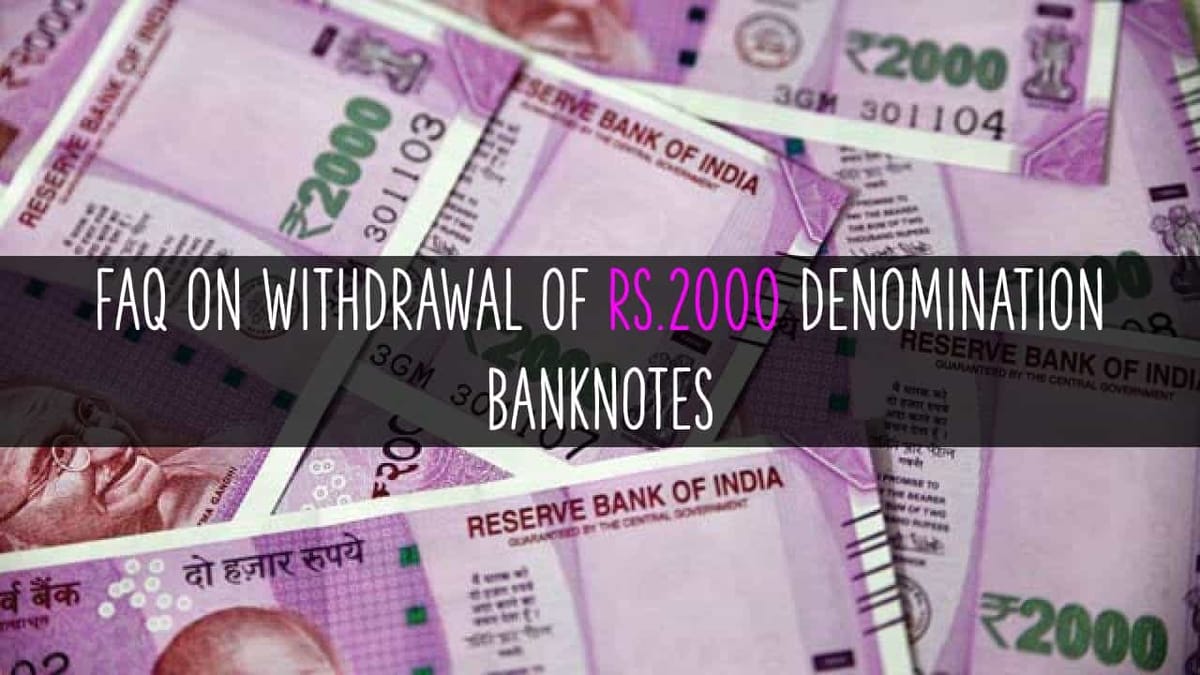Reetu | May 20, 2023 |

RBI releases FAQ on withdrawal of Rs.2000 Denomination Banknotes from Circulation
In light of the foregoing and in accordance with the Reserve Bank of India‘s “Clean Note Policy,” it has been decided to withdraw the Rs.2000 denomination banknotes from circulation. The banknotes in Rs.2000 denomination will continue to be legal tender.
For the public’s knowledge and convenience, RBI has released Frequently Asked Question(FAQs) on withdrawal of Rs.2000 Denomination Banknotes from Circulation.
FAQs are given as follows:
The Rs.2000 denomination banknote was introduced in November 2016 under Section 24(1) of RBI Act, 1934 primarily with the objective to meet the currency requirement of the economy in an expeditious manner after withdrawal of the legal tender status of all Rs.500 and Rs.1000 banknotes in circulation at that time. With fulfilment of that objective and availability of banknotes in other denominations in adequate quantities, printing of Rs.2000 banknotes was stopped in 2018-19. A majority of the Rs.2000 denomination notes were issued prior to March 2017 and are at the end of their estimated life-span of 4-5 years. It has also been observed that this denomination is not commonly used for transactions. Further, the stock of banknotes in other denominations continue to be adequate to meet the currency requirement of the public.
In view of the above, and in pursuance of the “Clean Note Policy” of the Reserve Bank of India, it has been decided to withdraw the Rs.2000 denomination banknotes from circulation.
It is a policy adopted by RBI to ensure availability of good quality banknotes to the members of public.
Yes. The Rs.2000 banknote will continue to maintain its legal tender status.
Yes. Members of the public can continue to use Rs.2000 banknotes for their transactions and also receive them in payment. However, they are encouraged to deposit and/or exchange these banknotes on or before September 30, 2023.
Members of the public may approach bank branches for deposit and/or exchange of Rs.2000 banknotes held by them.
The facility for deposit into accounts and exchange for Rs.2000 banknotes will be available at all banks until September 30, 2023. The facility for exchange will be available also at the 19 Regional Offices (ROs) of RBI having Issue Departments1 until September 30, 2023.
Deposit into bank accounts can be made without restrictions subject to compliance with extant Know Your Customer (KYC) norms and other applicable statutory / regulatory requirements.
Members of the public can exchange Rs.2000 banknotes upto to a limit of Rs.20,000/- at a time.
Yes, exchange of Rs.2000 banknotes can be made through BCs upto a limit of Rs.4000/- per day for an account holder.
To give time to the banks to make preparatory arrangements, members of the public are requested to approach the bank branches or ROs of RBI from May 23, 2023 for availing exchange facility.
No. A non-account holder also can exchange Rs.2000 banknotes up to a limit of Rs.20,000/- at a time at any bank branch.
Deposit into accounts can be made without restrictions. The Rs.2000 banknotes can be deposited into bank accounts and cash requirements can be drawn thereafter, against these deposits.
No. The exchange facility shall be provided free of cost.
Banks have been instructed to make arrangements to reduce inconvenience to the senior citizens, persons with disabilities, etc., seeking to exchange/deposit Rs.2000 banknotes.
To make the entire process smooth and convenient for the public, a period of over four months has been given for deposit and/or exchange of Rs.2000 banknotes. Members of the public, are therefore, encouraged to avail this facility at their convenience within the allotted time.
For redress of grievance in case of deficiency of service, the complainant / aggrieved customer may first approach the concerned bank. If the bank does not respond within a period of 30 days after lodging of the complaint or if the complainant is not satisfied with the response/resolution given by the bank, the complainant can lodge the complaint under the Reserve Bank – Integrated Ombudsman Scheme (RB-IOS), 2021 at the Complaint Management System portal of RBI.
In case of any Doubt regarding Membership you can mail us at [email protected]
Join Studycafe's WhatsApp Group or Telegram Channel for Latest Updates on Government Job, Sarkari Naukri, Private Jobs, Income Tax, GST, Companies Act, Judgements and CA, CS, ICWA, and MUCH MORE!"